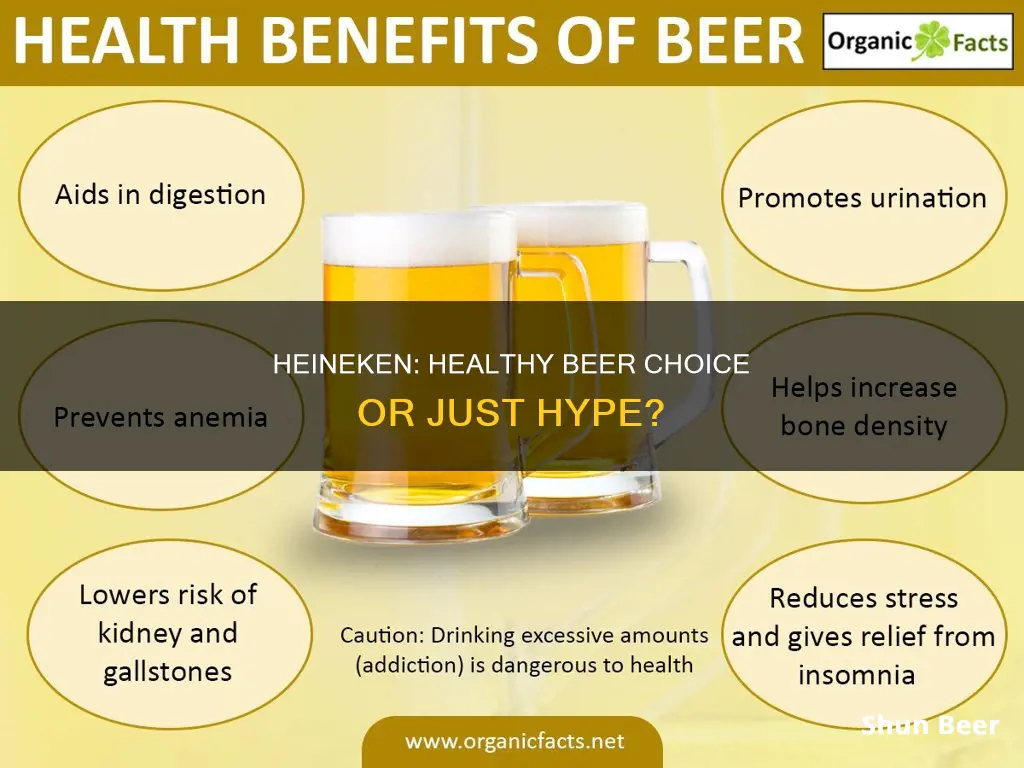
Heineken's chief commercial officer, Alexis Nasard, sparked a debate about the health benefits of beer when he claimed on CNBC that there is everything healthy about beer. Nasard argued that beer has fewer calories than milk and is one of the few drinks that is purely natural, being made from water, hops, barley, and yeast. Heineken has also been advertised as a clean beer, free from distracting flavors and aromas, with no sugar, fat, or cholesterol. However, it's important to note that excessive beer consumption can lead to negative health issues, and Heineken is not recommended for individuals with high blood pressure. So, is Heineken a healthy choice for beer? The answer is nuanced, and while some studies suggest potential health benefits, moderation is key to enjoying Heineken without adverse effects.
What You'll Learn

Heineken's health benefits
Heineken's chief commercial officer, Alexis Nasard, has claimed that "there is everything healthy about beer". Heineken is brewed in the Netherlands and has been advertised as a healthy alcoholic beverage. While it is true that Heineken contains a lot of calories and carbohydrates, it has relatively fewer calories than a glass of milk and other similar styles of beer on the market. Heineken has no fat or cholesterol and zero grams of sugar, making it a good option for those watching their weight or sugar intake.
Heineken and other beers are high in folic acid, which can reduce the risk of heart attacks. Beer also contains soluble fibre, which aids digestion, and is rich in dietary silicon, which increases bone density and may help fight osteoporosis. Beer is also a source of B vitamins and antioxidants, which may help lower the risk of cancer, improve mood, and provide protection from diabetes.
In addition, Heineken is brewed with hops, which contain xanthohumol, a compound with antioxidant properties. According to a study in the journal Nutrients, the antioxidants in beer can reduce LDL oxidation, a process that causes plaque-forming inflammation in the arteries, thus lowering your chances of heart attack and disease.
However, it is important to note that excessive beer consumption can contribute to liver damage, weight gain, and reduced testosterone levels. Drinking more than two bottles of beer per day can lead to negative side effects and increase the risk of developing fatty liver disease or cirrhosis. Therefore, Heineken and other beers should only be consumed in moderation.
Beck's Beer: Healthy Drinking or Marketing Hype?
You may want to see also

Heineken's calorie count
When comparing beer to other alcoholic beverages, Heineken's chief commercial officer, Alexis Nasard, argued that beer has fewer calories than milk and contains no additives. In support of this claim, the Beer Education Trust reported that a half-pint (284ml) of 3.8% bitter (pale ale) contains 85 calories, while the same amount of orange juice has 128 calories. Additionally, a medium-sized glass (175ml) of white wine contains 131 calories, and red wine has 119 calories.
While beer, including Heineken, can be part of a healthy diet when consumed in moderation, it is important to be mindful of the calorie content and make informed choices. As Jack Edmonds, a Harley Street General Practitioner in London, stated, "It is not beer that makes you fat, but the lifestyle and eating habits that may go along with beer drinking." Therefore, enjoying a Heineken occasionally and in moderation can be part of a balanced and healthy lifestyle.
Amber Beers: Health Benefits or Just a Myth?
You may want to see also

Heineken's sugar content
Heineken has often been touted as a healthier choice of beer by health-conscious drinkers. Heineken Light, for example, is said to be a good choice with just 90 calories and 6 grams of carbohydrates per bottle. However, it is important to note that the sugar content of Heineken may vary depending on the type of beer and the region where it is brewed and sold.
According to Healthline, Heineken has 11.4 grams of carbohydrates and 0 grams of sugar. On the other hand, MyDietMealPlanner reports slightly different nutrition facts for Heineken, stating that it contains 11.5 grams of total carbohydrates and 0 grams of sugar per bottle.
It is worth noting that the sugar content in beer is created by something called beer gravity, which refers to the density of the liquid extracted from the mashing process during brewing. After the fermentation process, beer typically comprises 80% fermentable sugars and 20% oligosaccharides, a type of carbohydrate. However, the final sugar content of a beer is based on several factors, including its gravity, the type of yeast used, and any additional flavours that might be included, such as honey or corn syrup.
While Heineken is shown to have no sugar, it is still important to consider the total carbohydrate content, which can contribute to the overall caloric value of the beverage. In general, the more carbohydrates a beer has, the higher the sugar content is likely to be. However, as previously mentioned, the sugar content of beer is typically very low, so it is not something that drinkers need to be overly concerned about.
In conclusion, while Heineken may not contain any sugar, it is important to consider the total carbohydrate content and overall caloric value when assessing its health benefits. However, when consumed in moderation, Heineken can be a relatively healthy choice when compared to other alcoholic beverages.
Gin and Tonic: A Healthier Alternative to Beer?
You may want to see also

Heineken's health risks
While Heineken is advertised as a healthy choice, it contains a significant number of calories and carbohydrates. Each 12-ounce (355 mL) bottle contains 149 calories and 11.4 grams of carbohydrates. Although Heineken has fewer calories than a glass of milk, as claimed by Heineken's chief commercial officer, Alexis Nasard, it is important to consider the overall calorie intake and its potential impact on weight management.
In addition, heavy drinking, including excessive beer consumption, has been linked to an increased risk of heart problems. While moderate alcohol consumption may provide some health benefits, such as a reduced risk of heart disease, it is crucial to maintain a healthy balance and not exceed recommended intake levels.
Furthermore, drinking beer, including Heineken, can negatively affect individuals with high blood pressure. While occasional drinking may have less impact, daily drinking can lead to long-term increases in blood pressure levels. Therefore, individuals with high blood pressure concerns should consult their healthcare providers before consuming beer regularly.
Lastly, while non-alcoholic beer may offer some health benefits, such as reducing post-workout inflammation, it is important to remember that Heineken contains alcohol, which is the primary contributor to the health risks mentioned above. Overall, while Heineken may have some positive attributes, excessive consumption can lead to adverse health effects, and it should be enjoyed in moderation as part of a healthy lifestyle.
Healthy Beer: Heineken 0.0's Nutritional Benefits and Taste
You may want to see also

Heineken's non-alcoholic alternatives
Heineken 0.0 is the brand's non-alcoholic beer offering. Unlike most non-alcoholic beers, which are carbonated drinks with added flavours to make them taste like beer, Heineken 0.0 is crafted like a regular beer and then has the alcohol removed. Heineken 0.0 contains less than 0.03% alcohol, an amount deemed to have no impact on the body. This means that it can be enjoyed at any time of the day and is even safe to drink when driving. Heineken 0.0 has the same refreshing fruity notes as Heineken Original, but with a softer, malty body. Heineken 0.0 is also significantly cheaper than the original, at £3.00 for four 330ml bottles, compared to £12.00 for 12 bottles of the same size of Heineken Original.
Heineken 0.0 is not the only low-alcohol alternative offered by the brand. Heineken Silver is a lighter, more balanced beer, brewed at -1°C, giving it an extra refreshing feel. Heineken Silver is less bitter than the Original, with a more crisp and subtle finish, making it a good option for those who are not usually beer drinkers. Heineken Light is another low-alcohol alternative, with 90 calories and 6 grams of carbs per bottle, while still retaining the brand's classic crisp taste.
Fruit Beer: Healthy or Unhealthy?
You may want to see also
Frequently asked questions
Heineken is a healthy choice of beer only when consumed in moderation. Heineken is brewed in the Netherlands and has been advertised as being healthy, but it contains a lot of calories and carbohydrates. Heineken has been deemed a moderate-calorie beer with a relatively low-calorie count, making it a good option for those counting calories. Heineken is also a clean beer, free from distracting flavours and aromas, and contains no fat or cholesterol.
Heineken has a range of health benefits, including no fat or cholesterol, a relatively low-calorie count, and no sugar. Beer is also high in folic acid, which can reduce the risk of heart attacks, and contains soluble fibre. Heineken is also safer than most water sources, as it has been boiled and kept clean during the brewing process, making it a healthier alternative to other alcoholic drinks.
Drinking too much beer can lead to accidents and even death. Alcohol is addictive, and drinking more than two beers a day increases the chances of developing fatty liver disease or cirrhosis. Beer can also lead to weight gain and negatively impact your waistline.
No, beer is not a good choice of drink for people with high blood pressure. While occasional drinkers have less to worry about, daily drinkers can cause long-term increases in their blood pressure levels. Heineken 0.0 is a healthier option for those with high blood pressure as it contains no alcohol.







